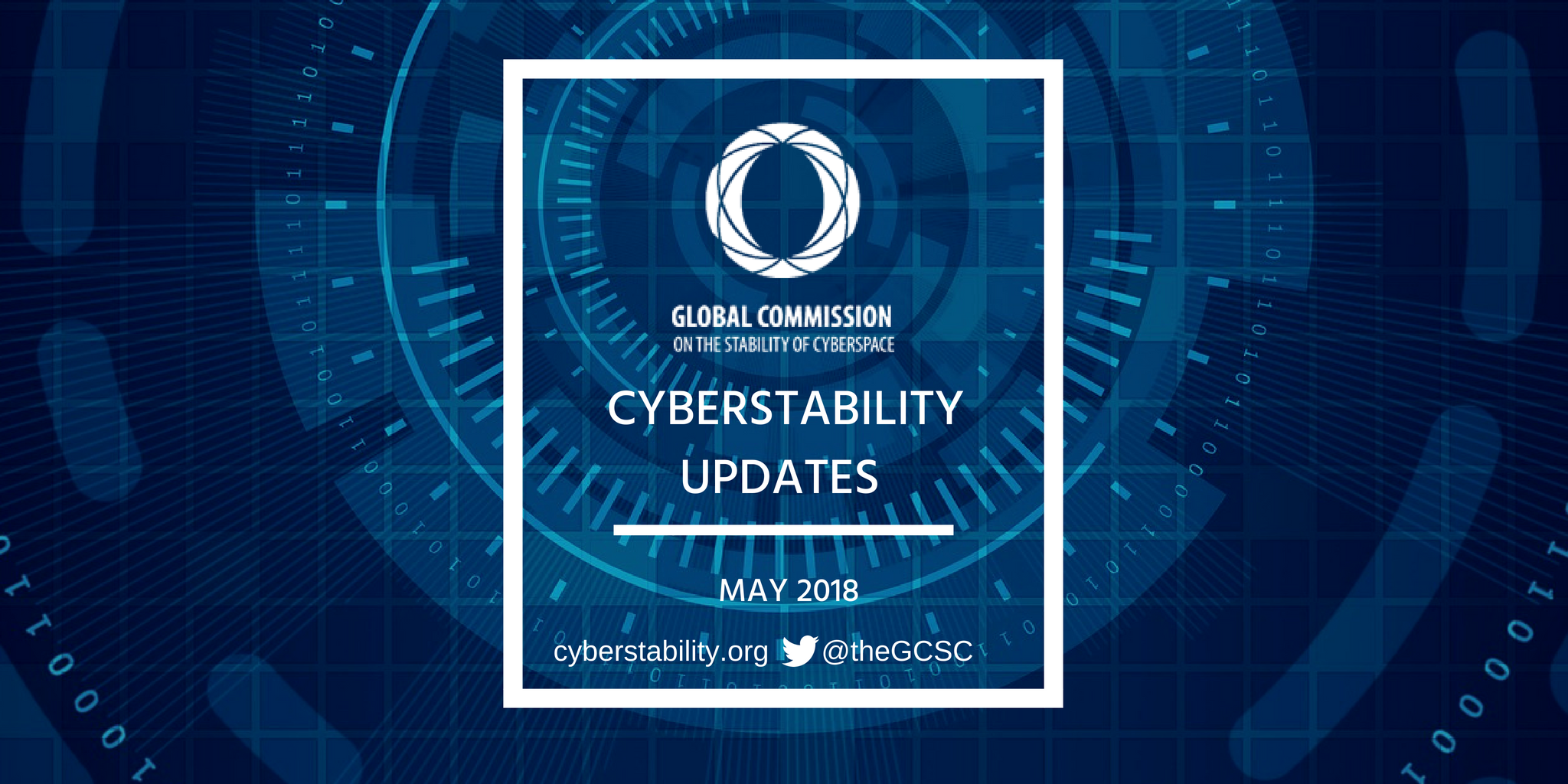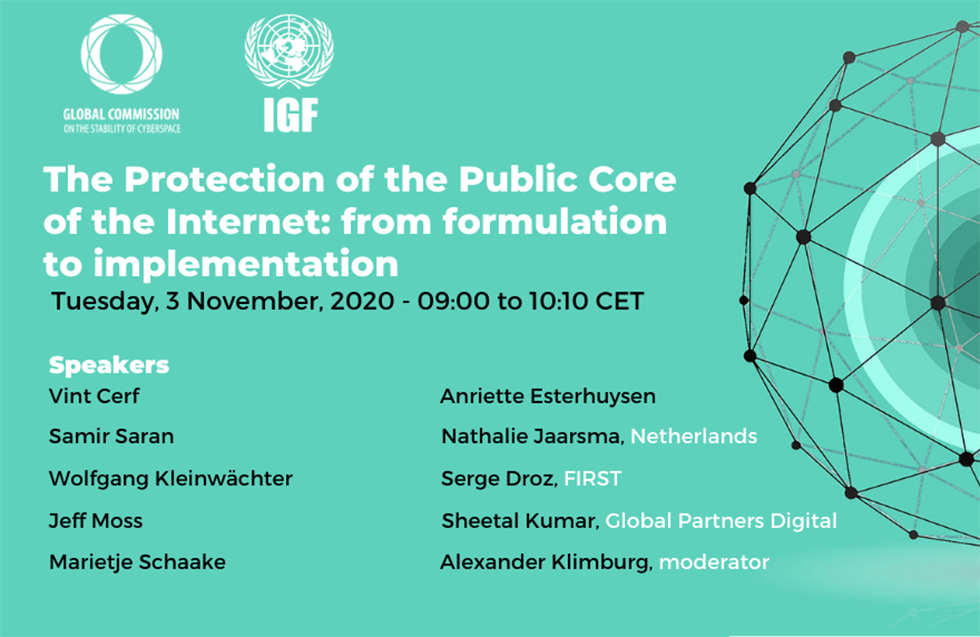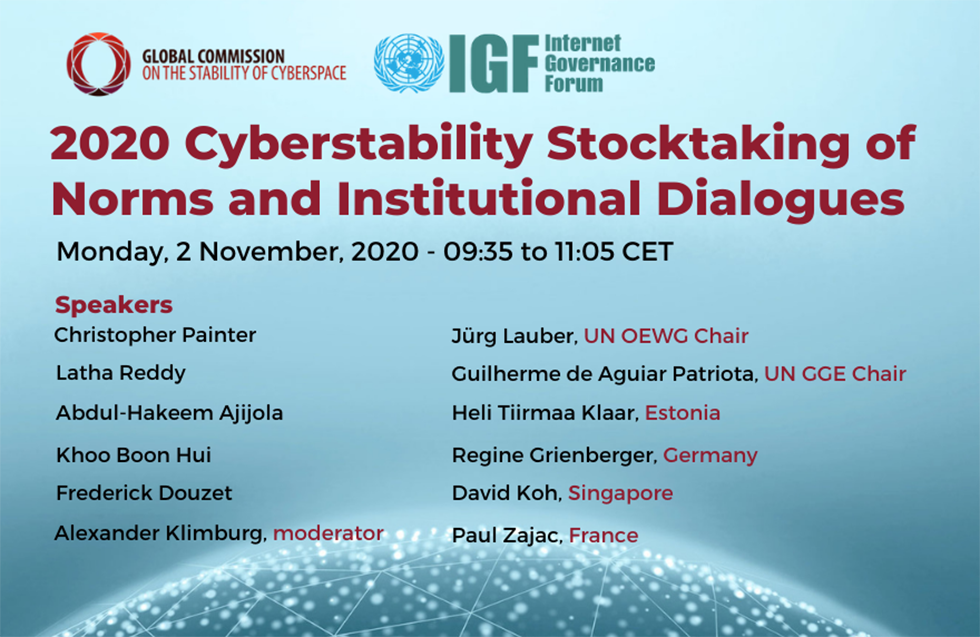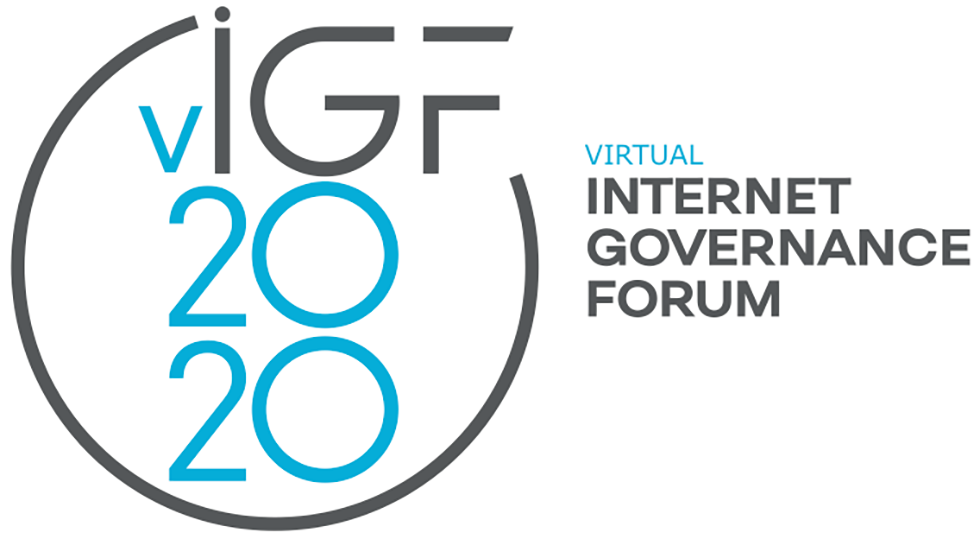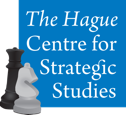The GCSC in the news
Cyber-stability wonks add election-ware to ‘civilised nations won’t hack this’ standard
The article by Simon Sharwood was published on 29.05.2018 in
The Register.
The Global Commission on the Stability of Cyberspace (GCSC) has called for an end to cyber-attacks on electoral infrastructure.
The GCSC works to develop “norms” of behaviour it hopes governments and others will adopt in order to leave internet infrastructure untouched during conflict. The body believes that as the internet is now critical to civil society, international agreements should protect its operation so that bystanders to conflicts aren’t harmed by disruptions to online services. Microsoft, the Internet Society and the governments of The Netherlands, France and Singapore have all funded the group.
Global think tanks offer solutions to increase election cybersecurity
The article was published on 25.05.2018 in
Inside Cybersecurity.
The Global Commission on the Stability of Cyberspace announced its endorsement Thursday of a new “proposed norm” decided on at a recent Commission meeting in Slovakia related to
elections, which reads that “state and non-state actors should not pursue, support or allow cyber operations intended to disrupt the technical infrastructure essential to elections,
referenda or plebiscites.”
Read more.
EU Considers Integrating New Norms of Cyberwar Into Security Policies
The article was published on 22.05.2018 in
Circle ID.
The norms were developed by the Global Commission on the Stability for Cyberspace (GCSC), a group backed and funded by the governments of The Netherlands, France and Singapore,
together with Microsoft and The Internet Society, that works to safeguard the Internet.
Read more.
Joint Statement: Let’s #SwitchItOn and #KeepitOn!
The article referring to the GCSC Call to Protect the Public Core of the Internet
was published on 16.05.2018 in the
Internet Society.
We need everyone’s voice to speak on behalf of an Internet that empowers us. The starting point is to protect the core of the Internet and the trusted collaborations that keep it together. People’s rights won’t be protected in the digital age without a globally accessible, trustworthy, and secure Internet. And we need governments to understand that using the Internet to control or manipulate what we say and do can not only violate human rights but also thwart the Internet’s promise for education, development, and a better future for everyone.
Globsec 2018 will cover security topics, artificial Intelligence and cyberspace
The article was published on 10.05.2018 in
the Slovak Spectator.
The norms were developed by the Global Commission on the Stability for Cyberspace (GCSC), a group backed and funded by the governments of The Netherlands, France and Singapore,
together with Microsoft and The Internet Society, that works to safeguard the Internet.
Read more.
Cyber threats in CEE and the Baltics
The article was published on 23.05.2018 in the Budapest Business Journal.
The conference at the Bérc utca offices of KKI in Budapest’s District 1 will run from noon until 3 p.m. and will be in English. Those interested in attending must register via the kki.hu website by noon today (Wednesday).
After a buffet lunch, opening remarks will be delivered by Károly Dán from the Hungarian Ministry of Foreign Affairs and Trade, followed by the keynote speech by Marina Kaljurand, chair of the Global Commission on the Stability of Cyberspace, from Estonia.
Former U.S. and European Leaders Start Group to Fight Election Hacking
The article featuring the GCSC Co-Chair
Michael Chertoff was published on
11.05.2018 in Bloomberg.
The group aims to conduct studies on how to better reduce risks to elections from Russian cyber threats, including looking at new technologies, and share their findings with
governments. Microsoft Corp. is
providing the commission with technical expertise and $300,000 in funds. Rasmussen said other ‘’seed’’ funding has come from his consulting company, and the group will continue to
raise money to back its work.
Chertoff said he hasn’t yet talked to the Trump White House about the group’s plans but has met with some lawmakers. He said Congress and the Department of Homeland Security, which
he headed under Republican President George W. Bush, have taken some steps to help U.S. states to bolster election security, but the efforts are still in early stages.
Read more.
The article authored by the GCSC Special Representative
Carl Bildt
was published on 09.05.2018.
If China’s development is being held back by anything today, it is the remnants of Marxism that are still visible in inefficient state-owned enterprises and the repression of
dissent. China’s centralized single-party system is simply incompatible with a modern and diverse society.
Read more.
Khoo Boon Hui: Promoting Norms of Behavior in Cyberspace
The article by Bruce McConnell featuring the GCSC Commissioner
Khoo Boon Hui was published on
08.05.2018.
Khoo Boon Hui (Paul), a Commissioner with the Global Commission on the Stability of Cyberspace (GCSC), sits down EWI cyber program chief Bruce McConnell to discuss the
commission’s work in promoting shared norms of behavior in cyberspace among countries around the world.
Read more.
The uphill battle to relaunch State Department’s cybersecurity policy office
The article featuring the GCSC Commissioner
Christopher Painter was published on
07.05.2018 in CyberScoop.
“I worry about a gap that leaves allies wondering and adversaries savoring the chance to take advantage of the perceived lack of U.S. leadership,” Christopher Painter, State’s
former cybersecurity coordinator, told CyberScoop.
Read more.
In these cyber war games, the fictional foe launching attacks sounds a lot like Russia
The article by Michael Birnbaum was published on 04.05.2018.
“On the day before 9/11, nobody thought a civilian aircraft could trigger a NATO military response,” said Marina Kaljurand, a former Estonian foreign minister who as ambassador to
Russia during the 2007 attack was charged with pushing the Kremlin to stop the assault. “Today, we’re in the same situation with cyber.”
Read more.
Norms in cyberspace
The article was published on 25.05.2018 in
K&L Gates LLP.
It is commonly said that cyberspace is the “Wild West,” a realm where there are no laws and no sheriff in sight. Even acknowledging that this view contains a degree of hyperbole, it
is unfortunately no less true after last year’s fruitless conclusion to a decade’s worth of international discussions regarding the future of international law in cyberspace. [1] The
United Nations (“UN”) Group of Governmental Experts (“GGE”) on Developments in the Field of Information and Telecommunications in the Context of International Security had been
considering the application of international norms to the member countries’ activities in cyberspace. Traditional powers, including the United States, China, and Russia, had
participated in the effort, [2] but negotiations were ultimately frustrated, as divisions along old “Cold War” lines prevented agreement on key terms. [3] In light of this
development, cyberspace appears likely to remain an international “Wild West,” with no established legal framework to address cyber attacks carried out or otherwise supported by
nation-states.
Read more.
This administration must lead on cyber
The article by Patrick Gaul was published on 24.05.2018.
The harsh reality is that America’s cyber adversaries are creating new norms in cyberspace, and they are doing so without experiencing any significant consequences for their
actions.
Read more.
In Defense of Sovereignty in Cyberspace
The article by Michael Schmitt was published on 08.05.2018.
Finally, it must be remembered that the international community’s objective in identifying norms for cyberspace through such processes as the
UN GGE
is to achieve greater global stability. States contemplating adoption of the “sovereignty as principle only” approach would be well served to consider how doing so is likely to
be perceived by other states. After all, States that do not intend to conduct offensive cyber operations or see themselves as likely victims will understandably perceive the approach
as threatening, particularly if espoused by states wielding substantial cyber capability. Additionally, the approach foregoes the potential deterrent effect the rule of sovereignty
might have on states contemplating hostile cyber operations. Problematically, its adoption by the broader international community would seem to justify characterization of
cyberspace as a “Wild West,” a depiction that, albeit part hyperbole, the international community has worked hard to put to rest.
Read more.
Private Companies Take the Lead in Cyber Security
The article by Tim Maurer was published on 04.05.2018 the
War on the Rocks.
Last month, 34 technology and security companies signed what they call the Cybersecurity Tech Accord, “agreeing to defend all customers everywhere from malicious attacks by cybercriminal enterprises and nation-states.” The
agreement is a remarkable initiative by a group of industry heavyweights, ranging from Cisco to Facebook, Microsoft to Nokia and Oracle, that usually tend to fight over customers or
patents rather than form political alliances. It raises the question, what motivated these companies and why did they sign this agreement now? More broadly, it is only the latest
sign that what norms govern cyber space and the global governance of cyber security – or, rather, the lack thereof – have captured the attention of corporate boardrooms around the
world.
Read more.
ASEAN Cybersecurity in the Spotlight Under Singapore’s Chairmanship
The article by Prashanth Parameswaran was published on 02.05.2018.
During Singapore’s chairmanship, the city-state has continued advancing the agenda around several areas, from increasing capacity-building and coordination to shaping basic norms in
cyberspace. Singapore officials had indicated at the outset that its tagline of “resilience and innovation” would include a focus on cyber issues as well as related areas such as
e-commerce and the digital economy. The key, Singapore’s Foreign Minister Vivian Balakrishnan had said in a lecture outlining Singapore’s ASEAN priorities last December at the
ISEAS-Yusof Ishak Institute, was to boost cyber security as “the flip side” of achieving greater prosperity in the digital economy.
Read more.
The article by Farlinda Said was published on 01.05.2018 in the
New Straits Times.
In great power rivalry, investment in the tech sector can ring alarm bells particularly where norms of state behaviour and confidence-building measures are not developed. Also a
product of the 32nd Asean Summit is the Asean Leaders’ Statement on Cybersecurity Cooperation that addresses the need for international voluntary cybersecurity norms, an expression
of commitment for a multi-stakeholder process across different domains and greater regional cybersecurity cooperation and capacity building to address cybersecurity and
cybercrimes.
Read more.
